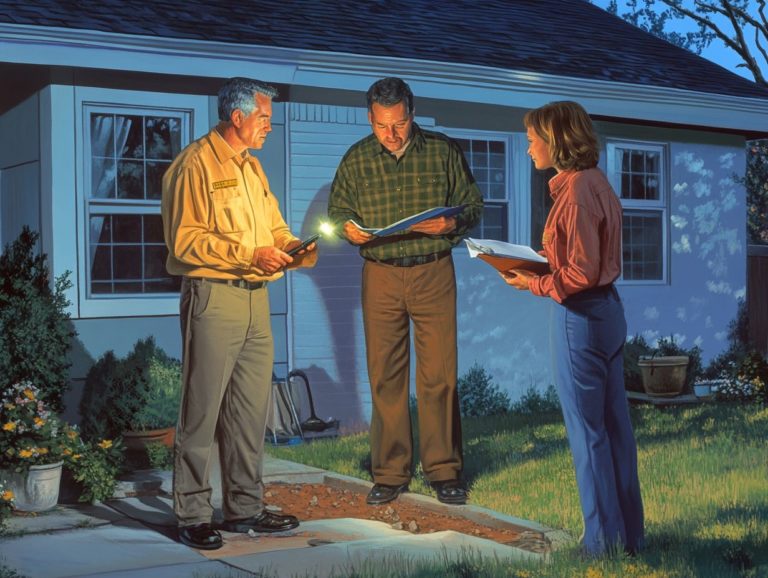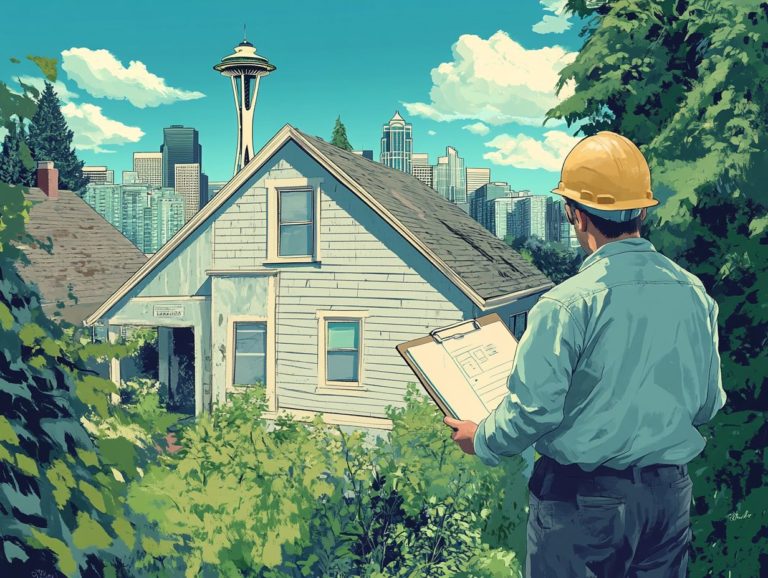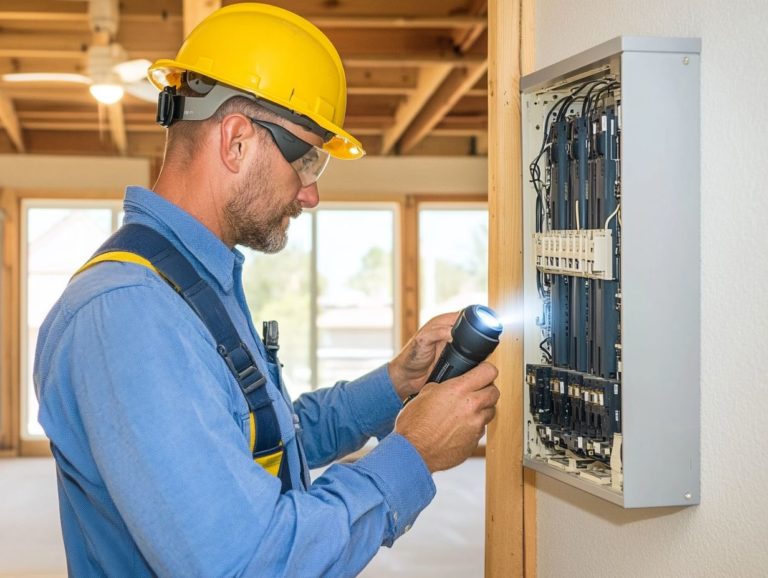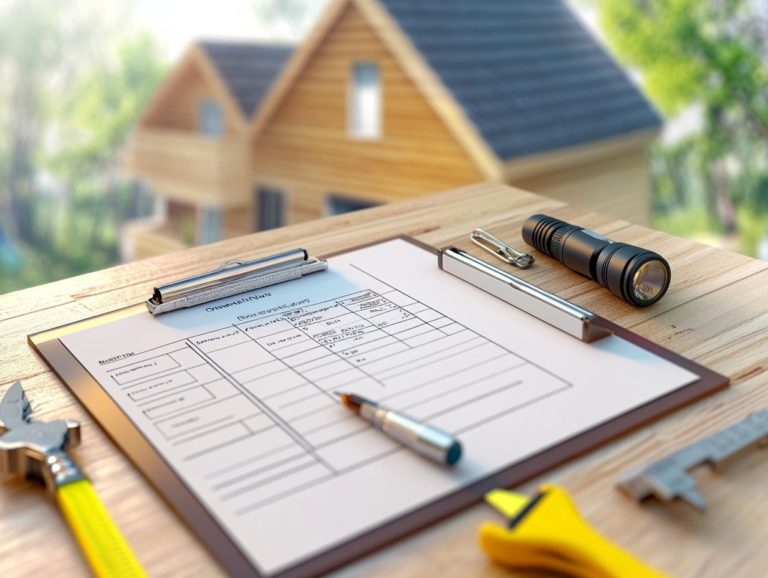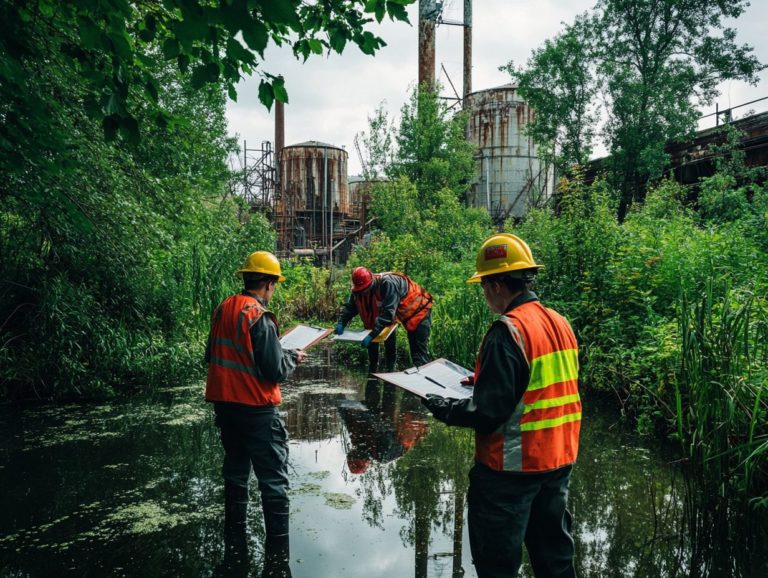What to Expect During a Home Inspection
Buying a home stands as one of life s most significant investments, and ensuring your future sanctuary is both safe and sound is essential.
A home inspection serves an important role in this journey, offering a comprehensive evaluation of a property’s condition.
This article delves into the intricacies of a home inspection, highlighting its importance and guiding you on what to watch for during the process.
From preparation tips to deciphering the results, you ll receive expert guidance at every stage, empowering you to make smart choices and discover your perfect home.
Contents
Key Takeaways:

- A home inspection is a thorough examination of a property’s condition, including its structure, systems, and components.
- Home inspections are crucial in identifying potential issues and risks, saving buyers from unexpected expenses and headaches.
- During a home inspection, pay attention to common areas such as the roof, foundation, plumbing, and electrical systems.
What is a Home Inspection?
A home inspection serves as a thorough evaluation of a property’s condition, carried out by a qualified professional inspector. This assessment covers essential aspects such as the foundation, heating, ventilation, and air conditioning (HVAC) system, plumbing, and electrical systems.
For potential buyers, this process is critical; it yields a detailed inspection report that illuminates serious issues that could influence their decision to purchase. This invaluable information plays an important role in shaping the negotiation dynamics between buyers and sellers, ensuring that smart choices are made.
Purpose and Process of a Home Inspection
The purpose of a home inspection is to provide you with a comprehensive understanding of a property’s condition and to identify any potential issues. It’s essential to know what to know about home inspection policies so that you can address any necessary repairs.
This process typically starts with you scheduling an inspection with a qualified inspector, often based on recommendations from your real estate agent or findings from online resources. The inspector will evaluate various aspects of the home, such as the roof, plumbing, electrical systems, and more, to identify areas of concern. For more information, check out what to expect with a home inspection.
Once the inspection is complete, the findings are compiled into a detailed report shared with both you and the seller. It’s crucial for you to review this documentation meticulously, as it can significantly influence the negotiation process.
Property disclosures outlining known issues from the seller are essential. Any discrepancies between these disclosures and the inspection findings can lead to further discussions about repairs or price adjustments.
Why is a Home Inspection Important?
A home inspection is essential for you as a potential buyer, offering a wealth of benefits while illuminating any potential risks that may surface during the home purchasing journey.
Benefits and Potential Risks
The benefits of a home inspection for you as a home buyer are substantial. It helps uncover serious problems and ensures the property’s condition aligns with your expectations.
Additionally, a home inspection provides you with essential leverage in negotiations with the seller. It grants you peace of mind, allowing you to move forward with your purchase confidently, knowing that you’re making an informed decision.
Plus, the financial savings can be quite significant; identifying issues early on can save you from costly repairs later. Conversely, neglecting to conduct an inspection can open the door to unexpected repairs and potential safety hazards, such as faulty wiring or structural concerns, which could lead to expensive consequences.
Ultimately, this proactive step not only protects your investment but also enhances your overall home-buying experience.
What to Look for During a Home Inspection

During a home inspection, you should prioritize key components of the property. Pay close attention to the foundation, HVAC system, plumbing, and electrical systems.
This thorough examination is crucial to ensuring the overall integrity and safety of the home.
Common Areas of Focus
During a home inspection, you should pay close attention to key areas such as the foundation, HVAC system, plumbing, and electrical systems. These elements are essential for assessing safety concerns and the overall condition of the property.
Inspectors will meticulously examine the foundation for any cracks or signs of settling. These can signal serious structural issues that may jeopardize the entire building.
Inspectors also scrutinize the HVAC system’s efficiency and condition. This impacts not just your comfort but also your energy bills and air quality.
In terms of plumbing, inspectors will check for leaks, water pressure, and the age of the pipes. This ensures the home isn t susceptible to water damage or costly repairs.
As for the electrical systems, they are evaluated to confirm they meet safety standards and can handle modern electrical loads. This is crucial for your peace of mind as a potential buyer.
By understanding these elements, you can make informed decisions that will shape your ultimate choice in purchasing a property.
Preparing for a Home Inspection
Preparing for a home inspection involves several crucial steps that you, as a home buyer or seller, should take to ensure a seamless and successful evaluation process. Understanding what to expect in a home inspection report can help you navigate this critical phase with confidence and clarity.
Steps to Take Before the Inspection
Before the inspection, it s essential for you to prepare by tackling minor repairs, creating a thorough property disclosure, and ensuring that your home is easily accessible for the inspector.
Take a moment to declutter your spaces. This allows the inspector to navigate the property with ease.
Clear out hallways, attics, and basements. Remove any personal items that might hinder a comprehensive examination.
It s also wise to review and organize any maintenance records or warranties for appliances and systems like Heating, Ventilation, and Air Conditioning (HVAC), plumbing, and electrical work. Presenting this documentation can give the inspector a clearer picture of your home s condition, ultimately making the inspection easier for everyone.
What Happens After a Home Inspection?
After a home inspection, it s essential for you to grasp how to interpret the results. This understanding plays a pivotal role for both buyers and sellers, as it directly influences the next steps in the negotiation process.
Interpreting the Results and Next Steps

Interpreting the results of your home inspection report requires a keen eye for detail, particularly in analyzing safety issues and identifying necessary repairs that could influence the negotiation process.
Once you ve carefully reviewed the report, it s essential to highlight any major concerns. Focus on critical components like the roof, plumbing, and electrical systems. Neglecting these can lead to significant financial repercussions down the line.
For sellers, taking the initiative to address these findings can pave the way for smoother negotiations. When discussing potential next steps, consider negotiating repair costs or determining who will take on the repairs.
Engaging in effective communication about these issues fosters a collaborative atmosphere, ultimately leading to advantageous outcomes for both parties.
Choosing the Right Home Inspector
Selecting the right home inspector is an essential step in your home-buying journey. A qualified professional can significantly impact the quality and reliability of the inspection results, ensuring that you make an informed decision about your investment.
Don’t leave your investment to chance choose the best inspector for your needs today!
Factors to Consider and Questions to Ask
When selecting a home inspector, pay close attention to their qualifications, certifications like the American Society of Home Inspectors (ASHI), experience, and the types of inspections they provide.
As a prospective buyer, consider the inspector’s familiarity with the specific property type you re interested in, including its age and unique features.
Asking relevant questions during your evaluation can reveal a lot about the inspector’s capabilities. Inquire about their field experience, request references from previous clients, and find out how long they ve been active in this profession.
It’s also wise to ask about the reporting process. How detailed are the reports, and how quickly can you expect them after the inspection?
Understanding whether the inspector carries liability insurance and the warranties offered can help gauge their reliability. Lastly, find out if they re available for follow-up questions, as ongoing support after the inspection can be invaluable.
Frequently Asked Questions
What is a home inspection and why is it important?
A home inspection is a visual examination of a house’s structure, systems, and components. It identifies potential problems that may need addressing. This process is crucial as it helps buyers understand the condition of the property they re considering.
Who typically conducts a home inspection?
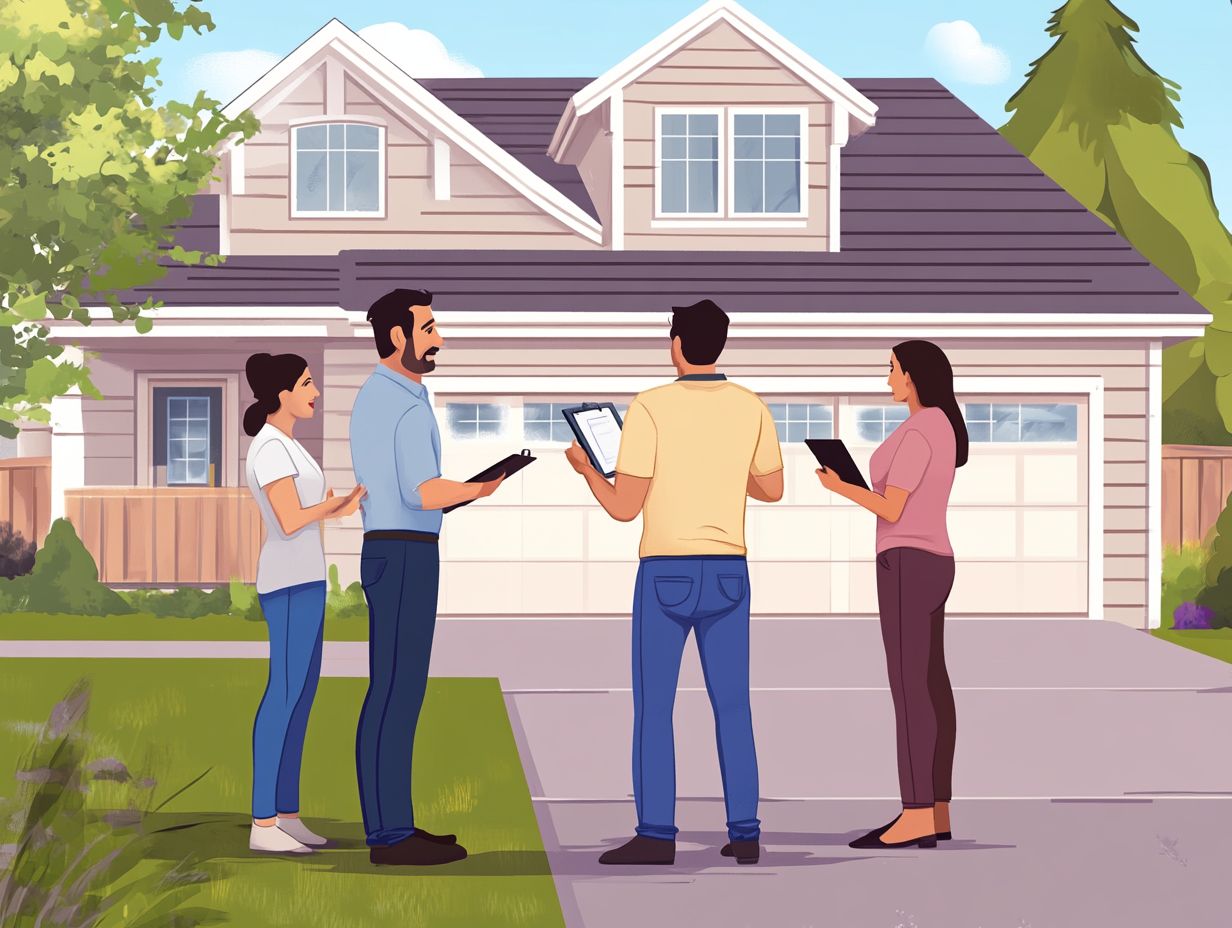
A professional home inspector conducts the inspection, possessing the necessary training, experience, and certifications to assess a property thoroughly. Sometimes, a seller may request their own inspection before listing the house.
What should I expect during a home inspection?
The inspector will thoroughly examine the interior and exterior of the house, including the foundation, structure, roof, plumbing, electrical, and HVAC systems. They will check for any water damage, pest damage, and potential safety hazards, so it’s important to know what to expect during a home inspection.
How long does a home inspection usually take?
The duration can vary based on the size, age, and condition of the house. On average, it takes 2 to 4 hours to complete. Larger or older homes may require more time for a thorough inspection.
Can I attend the home inspection?
Yes, buyers are encouraged to attend the home inspection. This allows them to ask questions and gain a better understanding of the inspector’s findings. Seeing potential issues firsthand can be beneficial.
What happens after the home inspection?
After the home inspection, the inspector provides a detailed report outlining their findings. This report helps buyers make informed decisions about the property and negotiate any necessary repairs with the seller. The buyer may also choose to hire a specialist for further assessment of any major issues found during the inspection.
Ready to learn more? Contact a qualified home inspector today!

